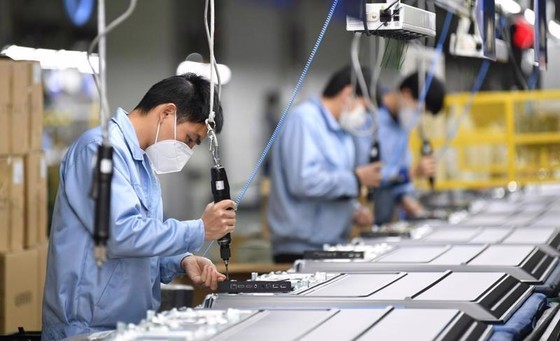 |
Illustrative photo |
Irrespective, cumbersome policies still deter businesses from borrowing capital, which poses further challenges.
Vicious cycle
A few days after the State Bank of Vietnam increased credit amount and some commercial banks reduced the interest rate, Mr. Nguyen Tri Trung, Chairman of the Board of Directors of the Gia Dinh Group Joint Stock Company, which specializes in the production of shoes for export, said that he had not yet received any specific information about this news. However, he said that if one can access capital at a lower interest rate then that will be very encouraging because most businesses now are facing an acute shortage of capital as orders have either decreased or have been canceled.
Under these circumstances, businesses are also trying to retain workers and maintain production. Mr. Trung said that a 2 percent interest rate support package sounds very attractive but the number of businesses that can access it is too few because of the prevailing strict conditions. He said that his company is currently borrowing short-term capital at an interest rate of 9 percent per year, while long-term capital is at over 10 percent per year, which is expected to increase even more by the coming year.
At a recent conference in Can Tho, many agricultural, forestry, and fishery exporters expressed their deep frustration. Mr. Le Van Quang, Chairman of the Minh Phu Seafood Corporation, said that the biggest concern of enterprises now is how to acquire around VND200 bln to buy raw shrimp and pay wages to their workers. Because if they don't buy raw shrimp, farmers will be unable to fill their ponds. Businesses are scared to borrow, even though concerns for capital seem to have been removed by banks at the end of November, although the interest rate is still too high. At the same time orders have decreased and the selling price has remained unchanged. This situation prevails across almost all businesses.
In the current scenario, enterprises are facing a vicious cycle for capital because in addition to high interest rates, borrowing capital during the current decline in global consumer demand is also very challenging. The solution no business wants is to accept discounted rates and sell cheaply to have some cash flow. It is a downward spiral, and long-term consequences are unpredictable and uncertain, especially for businesses with weak potential.
This year the export industry has faced unprecedented difficulties, including in essential products such as seafood, as orders have dropped sharply during peak season at the end of the year. This has created a vicious cycle. When businesses need capital, banks run out of credit, and when the banks offer more credit, businesses cannot borrow because they have no orders. In such a situation, even if the interest rate is reduced, it is not easy to get a loan.
Support policies
In a talk with Saigon Investment, Mr. Pham Xuan Hong, Chairman of the Ho Chi Minh City Textile and Garment Embroidery Association, said that enterprises that use many workers hope that at this time the Government has more policies to extend and delay payment of Value Added Tax (VAT) and social insurance. This will help businesses to have more resources to take care of workers during the coming Lunar New Year. Businesses now need support in retaining workers so that when the market grows again, enterprises will not have to worry about retraining workers for production.
Many businesses are recommending extending supportive policies into 2023, such as a 2 percent reduction in VAT, the extension of tax payment and land rent, after December 2022. The reason is that in 2023 difficulties are forecast to continue as Vietnam's main export markets have not yet recovered globally and so businesses will still need support.
Along with further tax exemption and reduction policies, removing the VAT refund is also very important for many businesses at this time. This will prevent businesses from facing severe cash flow shortages. The wood processing and export industry is a typical example of this scenario.
At the beginning of November, the Vietnam Timber and Forest Products Association (Viforest) sent an official dispatch to the Ministry of Agriculture and Rural Development and the Ministry of Finance, proposing to remove difficulties in confirming the origin of planted forest timber in VAT refund. According to Viforest, Vietnam's wood products exports to major markets such as the US, EU, and the U.K. are declining by 40 percent to 50 percent and the input cash flow of enterprises is stuck in VAT refund, which has made their woes even worse.
It is estimated that the VAT amount of enterprises using planted forest timber that has not been refunded so far has reached about VND1,000 bln, with hundreds of businesses currently affected. Some businesses have a tax amount of up to VND200 bln, and many businesses have from VND40 bln to VND50 bln, while the tax refund regulation does not exceed 40 days. In early December, the Ministry of Agriculture and Rural Development sent a document to the Ministry of Finance to remove difficulties for wood processing and export enterprises. It is expected that the difficulties of the wood industry will soon be removed.
During the last few months, it has been painful to see many export companies laying off thousands of workers in desperation due to a lack of orders. The situation in December is not too expected to be much better. Businesses now need to be fully prepared for the coming year as many serious challenges are forecast to cast a shadow on Vietnam's main export markets, which have not yet recovered globally. In these dire times, all businesses need outside support as their own efforts may not be sufficient enough.
























